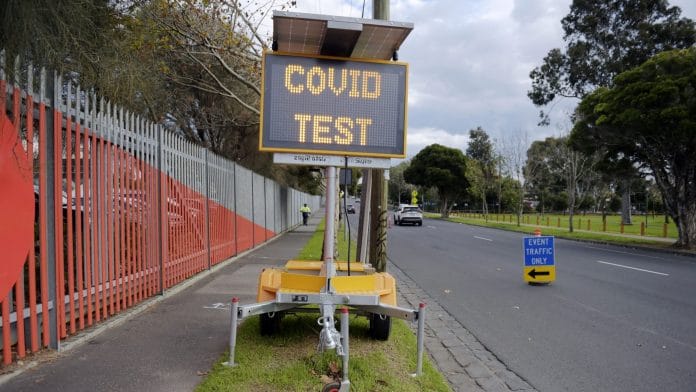Melbourne: Melbourne has gone 10 days without any reported Covid-19 cases, and the majority of its 5 million residents aren’t taking chances.
They are emerging cautiously from a 16-week lockdown that health experts say has helped put the city, and possibly the entire country, on track to eliminate the coronavirus. The Melbourne Cup horse race — known locally as the “race that stops the nation” — was held Tuesday without spectators, while people go about their daily activities in mandatory masks.
As cities in Europe and North America struggle to suppress a resurgence of the pandemic, Melbourne is an example of how the coronavirus can be brought under control even in the peak of winter by following stay-at-home and compulsory mask-wearing orders. New cases in the state of Victoria peaked in August, sparking deadly outbreaks in nursing homes that kept businesses shuttered and residents confined to their homes.
“Victorians have built something that is not only unique in our country, but is of international significance to have gone from more than 700 cases a day to now nine days of zero cases,” Victorian Premier Daniel Andrews told reporters in Melbourne Sunday. “Nine days of zero is not the same as a vaccine. Each of us has played a part in building this precious thing and each of us has to play a part in protecting it. If we want to stay open, then we have to stay safe.”
Security failures at hotels used to quarantine returning overseas travelers enabled the SARS-CoV-2 virus to spread across metropolitan Melbourne, creating the nation’s worst Covid hotspot. The flare-up showed “you can’t relax your attention,” said Helen Clark, the former New Zealand prime minister who is co-chairing an independent evaluation of the early global response to the pandemic.
‘Paid off’
Like in Melbourne, New Zealanders accepted unprecedented restrictions on their freedom of movement in the wake of the pandemic, Clark said in an interview from Auckland Tuesday. “But it paid off, and today we live in a much more relaxed life than sadly people in many other countries do.”
Soon Australia, New Zealand and other countries enjoying a diminished Covid threat could resume international travel in “a bubble approach” that would afford some safety in the absence of a licensed vaccine, Clark said.
“Having had success in stamping it out and continuing to stamp it out whenever it appears, you don’t want to import cases willy nilly,” she said. “The reality is, for countries that bungle the public health response, the economic damage is going to be deeper and longer lasting.”
Every day without a coronavirus case puts Victoria closer to successfully “shutting down local transmission,” said Catherine Bennett, chair in epidemiology at Melbourne’s Deakin University. No SARS-CoV-2 infections were found among the 10,653 people tested Sunday, the state health department said. Two were found on Oct. 29, the last time cases were reported in the state.
Also read: Should you wear masks during exercise? ICMR chief says yes, doctors, coaches disagree
Monitoring
Each week, Victoria is screening thousands of high-risk workers including from the aged-care and meat-packing industries, regularly monitoring wastewater for traces of the virus, and has vastly improved its ability to trace and isolate the contacts of cases, Bennett said.
“That certainly builds your confidence that all is quiet,” she said. “We, hopefully, now have a health system strong enough that we don’t have to face a third wave because we’ve got early warning, we’ve got sentinel surveillance, and we’ve got a really active, aggressive follow-up if cases start reappearing.”
Melbourne is now gradually loosening restrictions as it heads toward what the national government calls “Covid normal.” A 25-kilometer (16-mile) limit on traveling away from home will be lifted midnight Sunday.
If no new Covid-19 cases are reported in Victoria for 14 days, limits on public gatherings will be increased to 50 people outdoors and 20 visitors inside homes. After 28 days without cases, all restrictions will be lifted, with a phased return to on-site work for people who have been working from home since March.
“While the medicine’s been really tough and really hard to swallow, it’s done the job,” said Terry Slevin, chief executive officer of the Public Health Association of Australia.
‘Paid the price’
“There are countries that have the technical expertise and the capacity to do exactly what Victoria has done, but they haven’t,” Slevin said. “In other parts of the world, that same political leadership hasn’t supported the expert advice. And the truth is, those communities have paid the price with their lives.”
Australia, with a population of 25 million, recorded 907 Covid-19 deaths from 27,658 cases as of Sunday. It’s not taking that low tally for granted.
Sydney’s Gay and Lesbian Mardi Gras parade will be held in a stadium in front of 23,000 seated spectators next March, and organizers of the Australian Open in January are preparing to welcome a reduced crowd to the tennis tournament in Melbourne.
The hiss of disinfectant spray periodically broke the silence aboard a Melbourne streetcar recently as it rumbled past sparsely populated beachside patisseries, cafes and clothing stores. The half-dozen face mask-wearing passengers sat quietly rows apart as a cleaner sanitized tram surfaces around them.
In the suburb of St Kilda, bistros and bars usually jammed with tourists and holidaymakers on a Friday afternoon were hosting gatherings of mostly construction workers and families at outdoor tables served by face mask-clad waiting staff dutifully recording patrons’ contact details.
“I can’t see it going back to what it was before,” said Nicole Laski, who manages Monarch Cakes, a family-owned patisserie on Ackland Street established in 1934. “I think everyone’s learned a valuable lesson.”-Bloomberg
Also read: Covid cases near 10 million mark in US with no slowdown in sight






